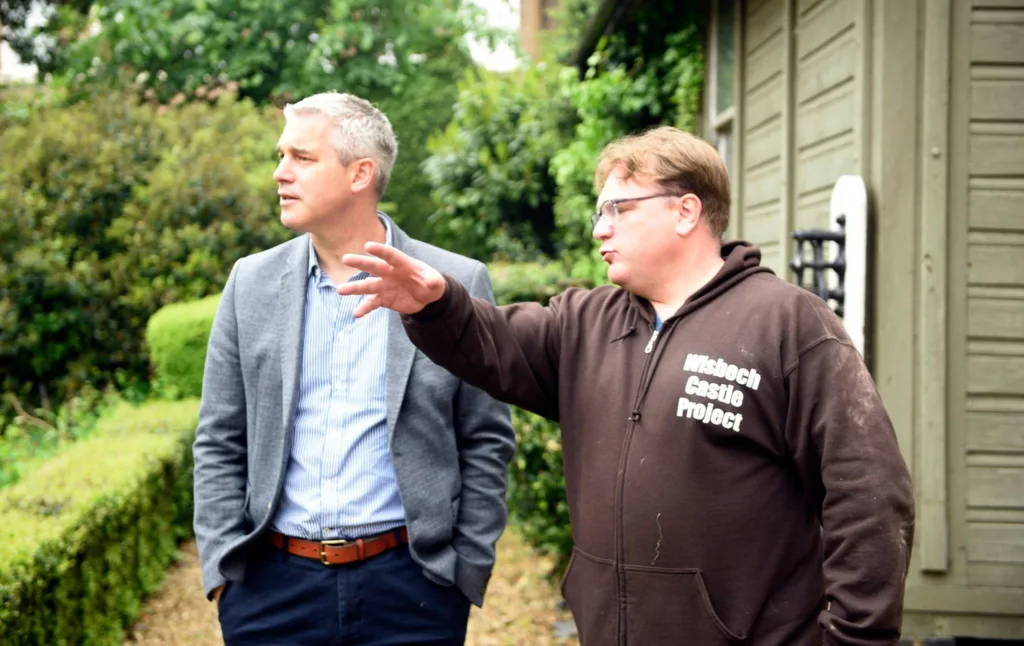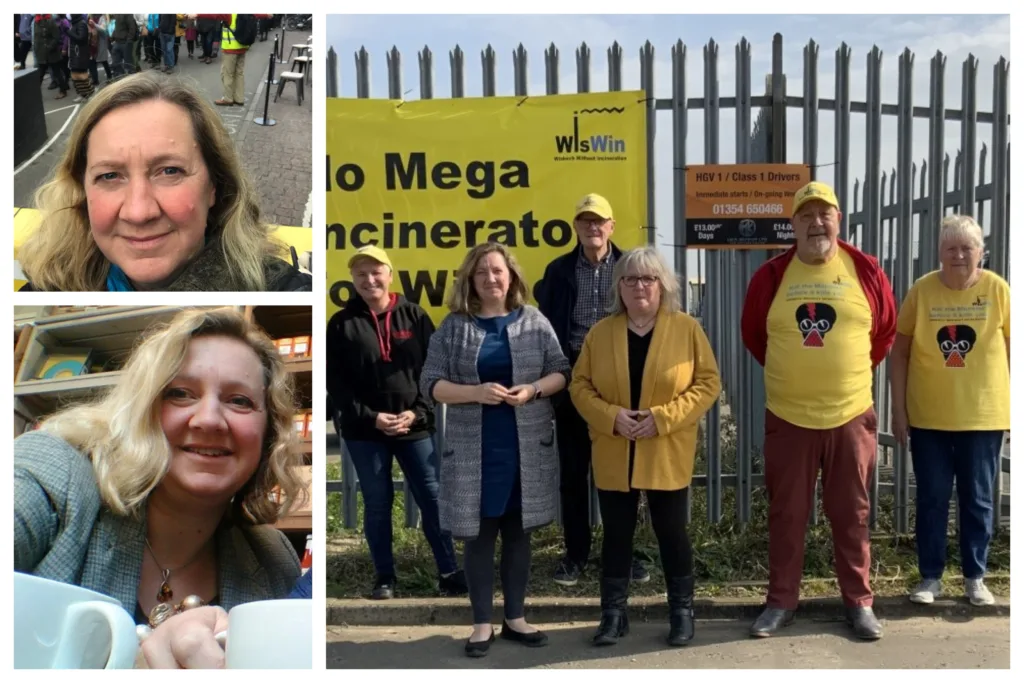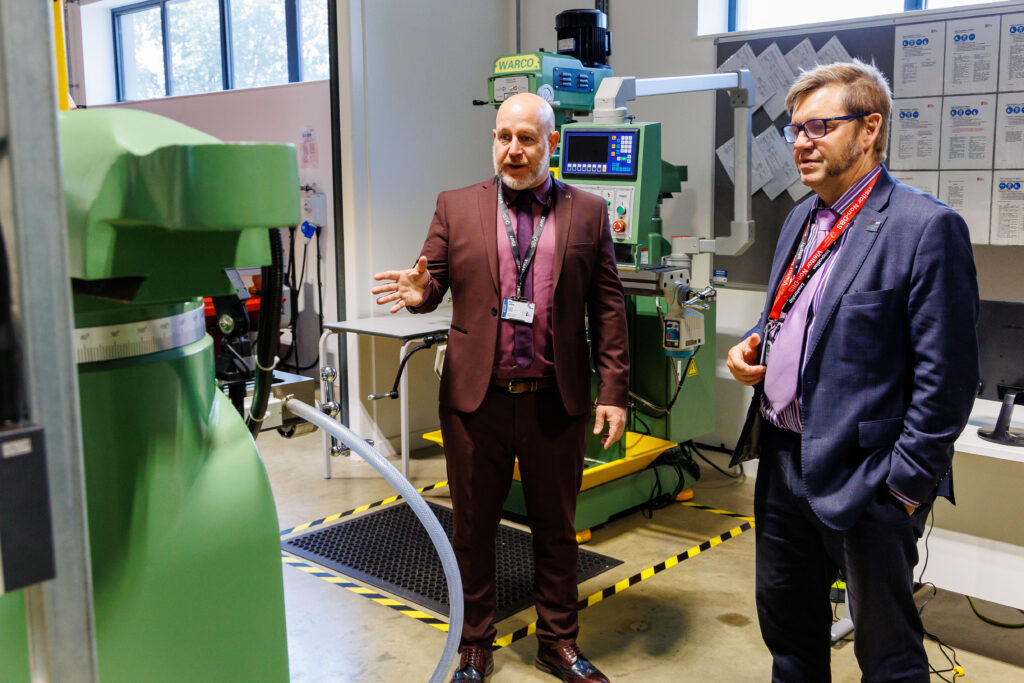MP Steve Barclay remains at the centre of a political maelstrom following his Government’s approval of a £450m incinerator on a 13-acre site at Wisbech which was dramatically pulled within 24 hours. The Government department headed by Mr Barclay – the Environment Agency and MP for NE Cambs – created a dilemma for Cabinet colleague Claire Coutinho, Secretary of State for Energy Security and Net Zero, after a brief announcement today that “clarification” of her decision was being sought.
Ms Coutinho had announced yesterday that the application from Medworth Energy for a waste combined heat and power facility at Algores Way, Wisbech, could go ahead.
But today the Planning Inspectorate, which comes under the control of the Department for Levelling Up, Housing and Communities where yesterday’s announcement was made, revealed that “we have removed previously published consent”.
The statement added that clarification is being sought and promised a “further update will be provided in due course”.

It seems Ms Coutinho – and her department officials – failed to spot that the Environment Agency was running a consultation for an environmental permit to be granted to Medworth Energy and consultations on that application do not end until tomorrow (February 22).
And with nearly 120 responses to plough through – many of them detailed and highly technical – that will be an onerous task.
The Environment Agency will take into account:
- Relevant environmental regulatory requirements and technical standards.
- Information on local population and sensitive sites.
- Comments on whether the right process is being used for the activity, for example whether the technology is the right one.
- The shape and use of the land around the site in terms of its potential impact, whether that impact is acceptable and what pollution control or abatement may be required.
- The impact of noise and odour from traffic on site.
- Permit conditions by providing information that we have not been made aware of in the application, or by correcting incorrect information in the application (e.g. monitoring and techniques to control pollution).
Fenland Council meanwhile is expected to pass a motion on Monday that includes inviting Claire Coutinho to visit Fenland “as soon as possible on whatever date her diary commitments allow, so that a formal meeting may be held at which she would be invited to explain in greater detail her rationale for approving the proposed incinerator”.
She will also be invited to “respond to questions and statements from Fenland District councillors about her decision”.
The latest developments have clouded statements from MVV Environment, the parent company of Medworth CHP Ltd, who might have believed their proposals for Wisbech would now go ahead unhindered.
The company issued a statement yesterday confirming that “the Medworth EfW CHP Facility will recover useful energy in the form of electricity and steam from over half a million tonnes of non-recyclable municipal (household), commercial and industrial waste each year.
“It has a generating capacity of over 50 megawatts; the steam and electricity can be used locally, and excess electricity will be exported to the grid.”
Paul Carey, MVV’s managing director, said: ‘We look forward to going ahead with this project, in accordance with the requirements of the Development Consent Order.

“We want to assure the local community that we will be a good neighbour as we build and operate the new facility, as we have already demonstrated at our facilities in Plymouth and Dundee’
He is hoping construction could possibly begin “sometime in 2025”.
And he promised “we’re going to be a good neighbour; we’re going to build this facility and operate it in exactly the way we said we would” but opposition to his proposals remain.
A reminder of that opposition will come on Monday when Fenland District Council decides whether to seek legal advice on a potential challenge to the decision to allow the Wisbech incinerator to be built.
The most prolific campaigning came from WinWIN (Wisbech Without Incineration) whose 3,000 Facebook group members held multiple rallies and even took protestors to the House of Commons and were greeted by Mr Barclay.
The incinerator was also opposed by Fenland District Council, Wisbech Town Council, Cambridgeshire County Council, Norfolk County Council, and the Borough Council of King’s Lynn and West Norfolk, as well as local action groups and hundreds of residents.
All feared the scale and potential negative impacts on residents.

Cllr Steve Tierney has put forward the motion to Fenland council, which says: “This decision is a slap in the face for the local democratic process and has resulted in real fear and understandable anger in the local community.”
The council acknowledges that if confirmed, the Secretary of State’s decision cannot be appealed but there may be a chance to challenge it at judicial review.
The motion before Fenland District Council asks members to agree to “authorise officers to instruct legal counsel with appropriate expertise to provide their opinion in respect of this decision and the way in which the Secretary of State has made it.
“Specifically, to advise whether there are any grounds for a judicial review to be sought to overturn this decision, and the likelihood that any such judicial review would be successful”.
The motion proposes that officers discuss with Wisbech Town Council, Cambridgeshire County Council, Norfolk County Council, King’s Lynn and West Norfolk Borough Council and Cambridgeshire and Peterborough Combined Authority whether they would contribute towards the cost of a judicial review should it be possible to pursue one.
It also “instructs officers to begin conversations with Wisbech Town Council, Cambridgeshire County Council, King’s Lynn and West Norfolk Borough Council, Norfolk County Council and the CPCA to establish what their contribution would be to the costs of a judicial review if there are grounds to pursue such action.
Further details of the Wisbech Incinerator proposal and developments to date at: www.fenland.gov.uk/wisbechincinerator
Read the Secretary of State’s decision letter and see all the related documents on the Planning Inspectorate website at https://infrastructure.planninginspectorate.gov.uk/projects/eastern/medworth-energy-from-waste-combined-heat-and-power-facility/

Chair of Cambridgeshire County Council’s Environment and Green Investment Committee, Councillor Lorna Dupre said: “The Minister’s decision is a huge disappointment to all of us locally who have opposed the Wisbech incinerator proposals and fought against Medworth MVV’s proposals for the edge of this historic town.
“Whilst we fundamentally disagree with the government’s decision and do not believe it is in the best interests of the people of Wisbech, we recognise the Secretary of State’s authority on the matter.
“When it comes to nationally significant infrastructure projects like this one, the decision – and responsibility for the decision – lies with central government.”
Medworth CHP Limited says their proposed development would recover useful energy in the form of electricity and steam from over half a million tonnes of non-recyclable (residual), non-hazardous municipal, commercial, and industrial waste each year.
The new plant would have a generating capacity of over 50 megawatts and the electricity would be exported to the grid. It would also have the capability to export steam and electricity to users on the surrounding industrial estate.
Medworth Energy is a wholly owned subsidiary of MVV Environment Limited (MVV). MVV is part of the MVV Energie AG group of companies. MVV Energie AG is one of Germany’s leading energy companies, employing approximately 6,500 people with assets of around €5 billion and annual sales of around €4.1 billion.
“The proposed development represents an investment of approximately £450m,” says Medworth Energy.
“The company has over 50-years’ experience in constructing, operating, and maintaining EfW CHP facilities in Germany and the UK.
EXCLUSIVE: Tories in turmoil after Government approves mega incinerator for Wisbech
“MVV Energie’s portfolio includes a 700,000 tonnes per annum residual EfW CHP facility in Mannheim, Germany. MVV Energie has a growth strategy to be carbon neutral by 2040 and thereafter carbon negative, i.e., climate positive.”
MVV’s largest project in the UK is the Devonport EfW CHP Facility in Plymouth.
“Since 2015, this modern and efficient facility has been using around 265,000 tonnes of municipal, commercial and industrial residual waste per year to generate electricity and heat, notably for Her Majesty’s Naval Base Devonport in Plymouth, and exporting electricity to the grid,” says the company.

Picture by Terry Harris.
“In Dundee, MVV has taken over the existing Baldovie EfW Facility and has developed a new, modern facility alongside the existing facility.
“Operating from 2021, it uses up to 220,000 tonnes of municipal, commercial, and industrial waste each year as fuel for the generation of usable energy.
“Biomass is another key focus of MVV’s activities in the UK market.
“The biomass power plant at Ridham Dock, Kent, uses up to 195,000 tonnes of waste and non-recyclable wood per year to generate green electricity and is capable of exporting heat.”

WisWIN protest: one of many staged by the protest group in recent yearsAt the July 2020 full council meeting, councillors from all parties at Cambridgeshire County Council joined together to oppose the development.
A council spokesperson said: “The county council declared climate and nature emergencies in 2019. The authority outlined its support for responsible renewable energy creation in its Climate Change and Environment Strategy and is working on innovative projects to reduce carbon emissions across the area.
“However, the scale of the development put forward by Medworth CHP Ltd and the potential impacts on local residents and the visual impact on the surrounding area raised serious concerns.
“In representations at the public inquiry earlier in the year, the county council highlighted the impact of the suggested development on the landscape, carbon emissions, and transport links in and around Wisbech.”

























